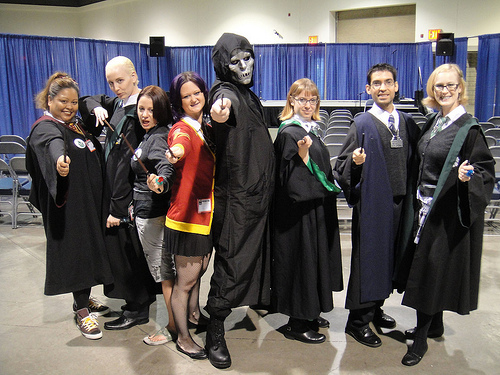Have you daydreamed about being a member of an intergenerational social justice organization like the Order of Phoenix? Do you want Dumbledore to be your mentor?
Have Dementors ever burned you out to the point where you doubted your ability to take on the Voldemorts of our world? Do you find yourself analyzing Dumbledore’s Army for lessons on developing liberatory vision, culture, leadership and organization?
Me too. It’s time we created our own Orders of the Phoenix to fight the Voldemorts in our world. I’ll meet you in the Room of Requirement, and until then, here are my top lessons from Harry Potter for social justice organizing.
The Voldemort Principle of Systems of Oppression and Getting Free
Voldemort and the Death Eaters suck, and they want to impose pure-blood supremacy in the magical world as a means to consolidate their power. Their strategy follows a familiar logic.
First, they organize society into classes according to socially perceived biological differences. Criminalize those on the margins, for example, those born of muggle parents, like Hermione. Then, they position themselves as the defenders of tradition and the natural order, divide society according to socially perceived biological differences and political loyalty.
They use fear and hate to weaken the bonds of solidarity throughout society, while simultaneously uniting the right. Fight the left, take power and remake the world in their own image. Dismal? But there’s more, and here’s where the insight lies.
Just as many of us come into activism through our growing awareness of injustices in society such as economic inequality, war, sexism and racism, Harry comes into activism through his growing awareness of Voldemort’s evil. But over time, Harry realizes that Voldemort is also inside his head.
While we who are activists can and must be literate in the ways that white supremacy creates profound disparity of access to resources such as housing, health care and education, we also come to find that white supremacy is inside our heads — for those of us who are people of color as internalized inferiority and for those of us who are white as internalized superiority.
Voldemort, like the real-world systems of oppression we are up against, is both a force in the world structuring our society and inside our heads.
The great South African anti-Apartheid leader Steven Biko once said, “The most powerful weapon of the oppressor is the mind of the oppressed.” If the oppressed fight each other based on differences of race, gender, ability, citizenship status, sexuality and so on, and if the oppressed also believe that there is no alternative — that they are incapable of making substantial change and are incapable of self-governing — then the oppressed will maintain the logic and institutions of deeply unequal and unjust societies.
In order to effectively take on Voldemort in the world, Harry must come to consciousness about the Voldemort in his head and resist his influence. Voldemort’s influence leads Harry into the battle at the Ministry of Magic, which results in Sirius’s death. It is Voldemort’s influence that also fuels Harry’s anger, which at times, isolates Harry from his comrades. When Harry directly challenges Voldemort in the world, Harry is able to free his mind of Voldemort’s influence.
On the flipside, as Harry becomes more aware of his connection with Voldemort, he is able to gain insights into Voldemort’s logic and plans. This moment, an apex of Harry’s consciousness, also provides an important insight about how we internalize the logic of systems of oppression. Through reflection and awareness, we can draw lessons on how oppression operates and use those lessons to help develop an anti-racist, feminist, disability justice, queer and transgender liberationist, working class-based anti-capitalist movement (aka the Left).
As social justice organizers and leaders, the responsibility rests on us to help more and more activists understand the world of power around them and its historical roots, to realize the way socialization and position in society impact our consciousness, and to understand our own personal decolonization from systems of oppression as part of collective struggles for social justice and structural equality. We must help one another become conscious of the ways Voldemort gets in our heads and, together, work to get free.
Come back to rabble.ca tomorrow for part two of Expecto Patronum: Lessons from Harry Potter for Social Justice Organizing.
THANKS: Thank you to my lovely team of fellow Order members for their editorial feedback, contributions and help: Rahula Janowski, Nisha Anand, Marc Mascarenhas-Swan, Caroline Picker, Morrigan Belle Phillips, Chris Dixon, April Caddell, Christina Aanestad, Liz Crockett Hixon and Aletha Fields.
Chris Crass is a longtime social justice organizer and educator and author of Towards Collective Liberation: anti-racist organizing, feminist praxi, and movement building strategy. He is a Unitarian Universalist and dreams of the day when his son, River, is old enough to go to a UU Hogwarts Camp. For more on his book and work go to www.chriscrass.org.
Photo: flickr/pop culture geek



